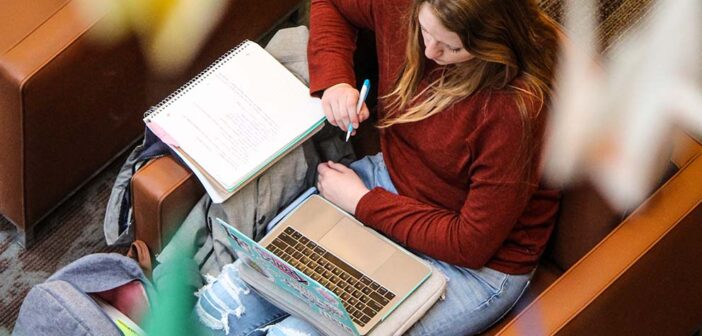Online exams have replaced the familiarity of in-person testing to accommodate different types of classes and learning objectives during the pandemic.
With the added concern of monitoring and maintaining academic integrity, remote learning has prompted Lehigh students and professors to adapt to exam format and policy changes.
Brian Chen, an associate professor in the Department of Computer Science and Engineering, said his CSE exams are proctored through Zoom and performed on paper.
To monitor academic honesty, Chen said he requires students to show their desk and papers on camera. In addition, he asks students to send a photo of themselves with their ID to ensure student identities.
“It’s hard to know what’s behind the camera, but internal programming is a problem-solving focused class,” Chen said. “The nature of the exam makes it possible to maintain academic integrity, but it may be harder with a class that is based on memorization.”
Phillip Coles, a professor in supply chain management, said he also uses Zoom to administer exams and a paper format for sections that require computations.
“My exams contain both multiple-choice and short-answer questions that are quantitative,” Coles said. “I have students upload their scratch papers for the multiple-choice exams so I can give partial credit.”
In addition to providing students with partial credit, Coles said grading math-based questions on paper is more effective because it provides a better assessment of his students’ problem-solving process.
Lori Herz, associate chair of the Department of Bioengineering, said, she uses an open note, open book and open internet policy. However, students aren’t allowed to talk to one another and are monitored through Zoom.
“In the real world, engineering students will have access to all these different resources,” Herz said. “I believe it’s important that they’re able to use information that is readily available and apply it to the different problems they’ll face outside of college.”
Herz said her exams are typically focused on application-based questions, which helps maintain academic integrity. Compared to in-class exams, though, online exams make it slightly harder to ensure students are respecting the honor code.
Trevor Belinsky, ‘23, who is in the Integrated Business and Engineering program, said the structure and procedures that his professors use to administer exams have been effective in upholding academic honesty.
“I have taken both open-note and heavily monitored exams this semester, and they’ve both been effective in terms of preventing students from cheating,” Belinsky said. “But the problem with open-note exams is the time crunch. You really can’t use your notes, let alone cheat while managing your time, so it’s really a matter of how well you know the material.”
Emily Nesgoda, ’21, a behavioral neuroscience student, said she prefers taking exams through lockdown browsers because it’s more suitable for certain testing formats and it helps secure online exams.
Lockdown browsers such as Respondus are proctoring services that restrict access to other applications and include features that use a camera to monitor eye movements and students’ surroundings.
“Using a lockdown browser is similar to taking exams in a classroom because it’s there to help prevent cheating,” Nesgoda said. “The lockdown browser reiterates the fact that it’s closed-note and emphasizes academic integrity guidelines.”
Molly Daniels, ’21, said using lockdown browsers for exams can be helpful, but it also comes with some challenges.
“Because Respondus is a relatively new concept, a lot of my professors had to take time out of their classes to practice using the program and making sure it works,” Daniels said.
Kendall O’Farrell, ‘22 said a disadvantage to proctoring exams through Zoom or Respondus is that it adds extra pressure to students while taking the exam.
“Being in the proctored exam is a little uncomfortable because I feel like I have to act a certain way to make sure they aren’t suspicious of cheating,” O’Farrell said.
She said especially with distractions at home, it’s difficult to focus on the exam, but there’s always a risk of being flagged for cheating.
Casey Zhong, ’21, said one of the challenges she faces when adjusting to online exams is that the change in exam structure doesn’t always match the subject of the class.
“Classes and exams that are computation-based are harder to take online because it’s much easier to solve problems on paper,” Zhong said. “It’s a lot harder to type numbers and formulas on the computer especially because it takes a lot of time.”
In addition to the changing policies and exam structure, Belinsky and Nesgoda both felt there has been an increase in the level of difficulty of the exams.
“I don’t know whether it’s because we’re just not learning the material to the same extent as we would in class, or if professors are just making exams harder to compensate for the online format,” Belinsky said.
The ease of transition to online exams are on a case-by-case basis. However, most students and professors are making the best of the situation.
O’Farrell said despite the circumstances, she thinks her professors have been doing a good job with online learning.
Coles said he is trying to optimize student’s experiences with online learning by encouraging students to communicate and ask more questions.
“Things go wrong,” he said. “We all had to shift over to Zoom and online communication, but that’s what life is like, and it’s definitely a learning experience, so we have to learn to adapt to unexpected challenges.”






Comment policy
Comments posted to The Brown and White website are reviewed by a moderator before being approved. Incendiary speech or harassing language, including comments targeted at individuals, may be deemed unacceptable and not published. Spam and other soliciting will also be declined.
The Brown and White also reserves the right to not publish entirely anonymous comments.
1 Comment
Hey there, I just read your article and I liked how you have described and pointed your content which is easily readable and understandable.
Great share! Keep up the good work. Thank you for posting.